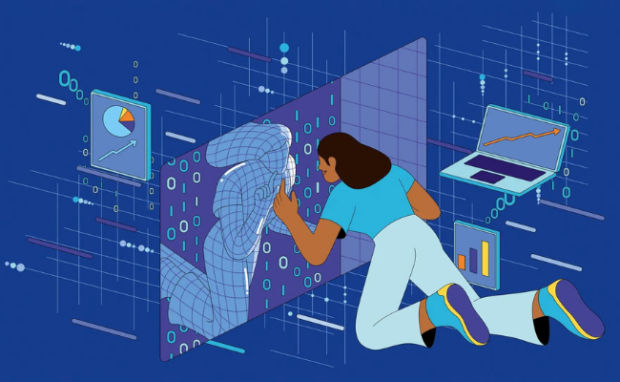The 4 Steps To Become An AI Professional Mid-Career
The rise of ChatGPT and similar AI tools sparked fears of technology taking over numerous jobs. In response, online sources recommend switching to an AI job. However, some people believe it is not viable. How can you become an AI professional while building your conventional career?
Fortunately, you can transition to AI despite working another job. The popular AI tools are easy to use and free, so you can learn and test them. Even better, your existing profession may help land other careers in artificial intelligence. Alternatively, you may boost growth in your current role by learning how to use AI tools.
This article will discuss steps to becoming an AI pro in the middle of your career. I will mention a few AI roles, so try to match them with your current job. Also, you may try these steps at your pace to suit your existing schedule.
How To Become An AI Professional Mid-Career
- Pick a specific role.
- Learn thoroughly about your AI role.
- Check your transferable skills.
- Build an AI project.
1. Pick a specific role.

Photo Credit: bizjournals.com
Most people think of people writing code when they hear “AI professional.” Contrary to popular belief, many AI jobs do not require coding skills.
AI firms create tools that use artificial intelligence to improve productivity in various fields. As a result, they need people who understand industries outside the tech industry.
Those pros allow AI companies to optimize their products and services properly. For example, you may work as a domain expert specializing in education.
You can help companies like Duolingo produce AI that will facilitate learning. Moreover, you may work as an artificial intelligence writer who explains the latest AI trends.
You may also like: The Top 10 ChatGPT Business Applications
For example, my article explains how you can transition your career into the artificial intelligence industry. As a result, more people can improve their lives with technology. If you are a call center agent, you may work as a virtual assistant instead.
The role addresses customer concerns bots can’t handle. Alternatively, you may help train chatbots. There are numerous AI careers for non-techies, like the ones I discussed. If you’d like to learn more about those professions, click here.
2. Learn thoroughly about your AI role.

Photo Credit: bdtechtalks.com
Let us say you’ve found the roles that fit your skills and experience. Learn more about the role from online resources like blogs and videos.
Articles like those from Inquirer Tech offer further insights into becoming an AI professional. Also, you may watch YouTube videos from news outlets or interviews.
Some report on the most trending careers, such as prompt engineer. According to Business Insider, the job pays roughly $335,000 annually.
If you want to use AI for business, learn about AI marketing. Watch videos from various professionals to implement the technology in your work.
On the other hand, you may attend seminars and workshops that teach about artificial intelligence. Also, you could approach a career coach about your goals.
3. Check your transferable skills.

Photo Credit: onlinedegrees.sandiego.edu
What if you recently graduated from university? The previous steps may not help you become an AI professional quickly enough. Instead, check your current skills. I mentioned AI firms hire other people besides techies.
They need people with creative, problem-solving, and communication skills. Also, they need people who can think critically and are not afraid to explore new ideas. You learn these from school, so you probably already have these skills.
You may also like: What Are OpenAI Embeddings?
If not, study online courses to help you. Alternatively, you may learn tech skills from free online sources. For example, check out my article regarding the Python programming language.
4. Build an AI project.

Photo Credit: wired.co.uk
I am not saying you should know how to create artificial intelligence. Instead, building an AI project means you will apply your skills. For example, use ChatGPT to improve your online article.
You could also use Midjourney or DALL-E to produce images for your social media posts. The goal is to train your skills. After all, merely reading about them will not enable you to use them in real life.
Expect your first projects to fail because it is your first time. Still, it’s fine because most widely-used AI tools are free. Soon, you may improve through constant practice to apply your new skills to an AI professional role.
Conclusion
You can become an AI professional in the middle of your career. You may choose numerous roles that do not require technical skills, such as writer and domain expert.
Digitalization continues to change our daily lives. Fortunately, artificial intelligence and other technologies offer ways for everyone to adapt.
It’s up to you whether you will use them to your advantage. Learn more about AI, virtual reality, gadgets, apps, and more at Inquirer Tech.
Frequently asked questions about AI professionals
Why choose an AI career?
Artificial intelligence continues to transform daily life worldwide. Specifically, it changes how we work by eliminating conventional roles and offering new ones. Working as an AI professional gives you the skills to adapt to ever-changing trends. As a result, you may continue earning money and building your career.
How can I become an AI professional?
You may take courses on artificial intelligence to build AI systems. On the other hand, you may apply for AI careers that do not require technical skills. For example, you can become a domain expert by helping an AI firm optimize its products in your field. Also, you may work as a virtual assistant to cover customer complaints bots cannot.
Is it difficult to learn artificial intelligence?
Learning how to build artificial intelligence systems is highly complicated. However, learning to use widely-used AI tools like ChatGPT is relatively easier. They accept simple commands, so you only need English language proficiency. You may also learn how to write effective ChatGPT prompts by clicking here.